Paywall-Free Monday Edition
"Your joy is resistance. Your rest is revolution."
We are well into our Season of Renewal, and today we ground ourselves in a truth many of us were taught to ignore: rest is not a luxury. It is a right. It is a reclamation. It is a return.
Yesterday, we spoke about joy as liberation—
how it stretches beyond the binaries of pleasure vs. pain and into the sacred remembering that we are meant to feel good. Today, we lean deeper into that truth and anchor it in our bodies.
We talk about rest—not just naps and sleep, but radical, intentional rest that pushes back against supremacy culture’s grind-to-survive demands.
1. Rest as a Reclamation of Humanity
Supremacy culture was built on the extraction of labor—particularly from Black, brown, disabled, and poor bodies. It reduces us to how much we can produce. We are taught that our worth lies in what we do, not who we are.
But rest refuses that.
Rest says: I am a whole human, even when I do nothing.
Rest reminds us that we are not machines. It refuses commodification and reclaims personhood. And for those of us descended from chattel slavery—whose ancestors were seen as property before people—this act of rest is sacred. It is ancestral. It is revolutionary.
Self Example: A Black woman gives herself permission to nap in the middle of the day without guilt, breaking the generational trauma of always having to prove her worth.
Reflection Prompt: Where did you first learn that rest was something you had to earn?
2. Rest Interrupts the Cycle of Burnout
Let’s be clear: burnout is not a personal failure. It is a systems failure.
We are living in a culture that was never designed for our thriving. It demands perfectionism, performance, urgency, and output—even if it costs us our well-being. It’s not sustainable. And it’s not liberation.
So many of us—especially those doing liberation work—get caught in a cycle of giving, giving, giving, until our nervous systems collapse. Rest disrupts that.
Rest interrupts urgency. It interrupts burnout. It is how we stay in the work for the long haul.
Work Example: A social justice organization includes rest weeks after major campaigns, naming rest as part of their strategy—not a reward.
Home Example: A caregiver institutes quiet hours for everyone in the household to rest, restore, and reset.
Reflection Prompt: What stories have you been told about burnout and productivity? What might it look like to write a new one?
3. Rest as a Collective Practice
We often think of rest as something we do alone, in the quiet, behind closed doors. But rest can also be communal.
It can be shared, celebrated, and ritualized. Collective rest teaches us how to care for each other’s capacity, how to co-regulate, and how to be in deeper relationship.
We’ve forgotten what it means to rest together. But our ancestors didn’t. Communal bathhouses, hammams, the Saturday morning music and cleaning in Black households—all of that is sacred. All of that is resistance.
Collective Example: A community hosts “Pancakes & PJs”—a slow Sunday morning of food, rest, storytelling, and ease. No performance. No productivity. Just love.
Workplace Example: A team creates a shared collective care calendar that includes emotional check-ins, breaks, and workload sharing.
Liberation Example: A local circle hosts a Liberation Lounge where folks come to nap, journal, move gently, and simply be—with no agenda but rest.Reflection Prompt: How can you incorporate collective rest into your world—at home, in community, or at work?
Remember This:
Rest is not a reward. It is your birthright.
You are not lazy. You are reclaiming what was stolen.
Burnout is not your fault. Its a byproduct of a system built to extract.
Your rest is sacred. Your rest is resistance.
We’re not just talking about slowing down for the sake of self-care aesthetics. This is about divesting from grind culture, deprogramming our worth from productivity, and building new systems of communal care.
So yes—nap in the middle of the day. Create screen-free nights. Celebrate slow Saturdays. Reclaim the rhythm of your own body. Because…
You are not here to be consumed.
You are here to remember who you are.
Practice Your Praxis: The C.A.R.E. Model™ as offered through the L.I.B.E.R.A.T.E. Framework™
To truly reclaim rest as a radical act, we must expand our definition of care. The C.A.R.E. Model™ offers a liberation-based framework for shifting how we relate to ourselves, our needs, and our communities—especially when it comes to rest.
C – Collective Responsibility
Rest is not just an individual act—it’s something we must hold sacred as a collective. In liberation communities, we hold responsibility for one another’s wellness. This means checking in, sharing burdens, and actively resisting grind culture together.
Example: In a family or community pod, people rotate caregiving responsibilities to ensure everyone gets uninterrupted rest without guilt.
Reflection: Where can I invite more shared responsibility so others—and myself—can truly rest?
A – Acknowledgment of Needs
Supremacy culture gaslights us into ignoring or minimizing our needs. Reclaiming rest begins with honestly acknowledging when we’re tired, depleted, overwhelmed, or emotionally burdened.
Example: A workplace encourages “capacity check-ins” before meetings, acknowledging when someone is at emotional or physical capacity and adjusting expectations.
Reflection: What needs have I been silencing in order to be seen as “capable” or “strong”?
R – Rest as Resistance
We don’t rest to be better workers. We rest to be whole. We rest because our ancestors could not. We rest as a reclamation of time, worth, and body.
Example: An activist collective shuts down operations for one week every quarter—declaring it a Rest Week rooted in political resistance and cultural healing.
Reflection: What internalized beliefs keep me from seeing rest as a legitimate form of resistance?
E – Equity in Emotional Labor
Not everyone has equal access to rest—especially women, more so Black and Brown women, femmes, non-men, caregivers, and people in marginalized bodies who are often expected to hold the emotional weight of others. Equity in rest means redistributing that labor and creating systems of mutual care.
Example: In a household, rest isn’t just "mom’s self-care night"—it’s everyone’s responsibility to support the system that makes her rest possible, consistently and equitably.
Reflection: Whose rest am I benefiting from? And how can I help redistribute emotional and physical labor to make rest possible for all?
Journal Prompts
Where did I first learn that rest had to be earned?
What would it look like to practice rest as a sacred ritual?
How can I incorporate collective rest into my rhythms?
🎯 Action Steps
📅 Mark your calendar for April 8th. That is your official Radical Rest Day. No emails. No expectations. No performance. Just softness. Just stillness. Just you.
Come into the Make Shi(f)t Happen group (paid subscriber bonus) and share what your Radical Rest Day will look like. Let’s witness each other’s reclamation.
Become a paid subscriber to continue the work of dismantling supremacy culture and cultivating something new and equitable.
Already a paid subscriber? Offer this as a gift to someone who needs it
In solidarity and slowness,
Desireé B. Stephens CPS-P
Educator | Counselor | Community Builder
Founder, Make Shi(f)t Happen

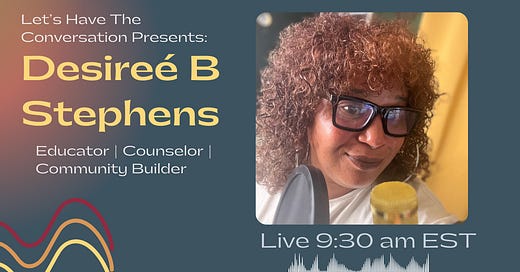



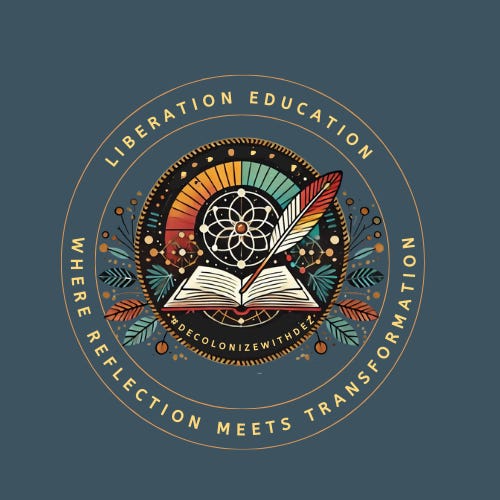

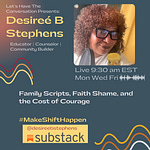


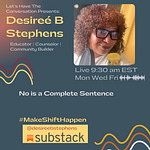

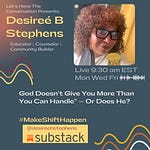
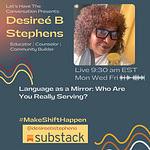
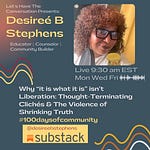
Share this post